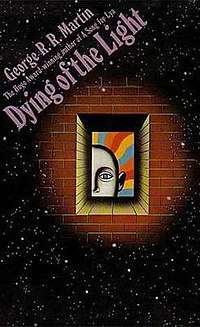Dying of the Light
 Cover of first edition (Hardcover) | |
| Author | George R. R. Martin |
|---|---|
| Country | United States |
| Language | English |
| Genre | Science fiction novel |
| Publisher | Simon & Schuster |
Publication date | 1977 |
| Media type | Print (hardback & paperback) |
| Pages | 365 pp |
| ISBN | 0-671-22861-7 (first edition, hardback) |
| OCLC | 3121162 |
| 813/.5/4 | |
| LC Class | PZ4.M381145 Dy PS3563.A7239 |
Dying of the Light is American author George R. R. Martin's first novel, published in 1977 by Simon & Schuster. Martin's original title for this science fiction novel was After the Festival; its title was changed before its first hardcover publication.[1][2] The novel was nominated for both the Hugo Award for Best Novel in 1978,[3] and the British Fantasy Award in 1979.[4]
Dying of the Light is set in the same fictional "Thousand Worlds" universe as several of Martin's other works, including Sandkings, Nightflyers, A Song for Lya, "The Way of Cross and Dragon" and the stories collected in Tuf Voyaging.[5]
Release
Dying of the Light was first serialized in abridged form under the title After the Festival in the April through July 1977 issues of Analog Science Fiction and Fact. The title refers to the festival of 14 worlds that precedes the story.
Plot
The novel takes place on the planet of Worlorn, a world which is dying. It is a rogue planet whose erratic course is taking it irreversibly away from its neighboring stars into a region of cold and dark space where no life will survive. Worlorn's 14 cities, built during a brief window when the world passed close enough to a red giant star to permit life to thrive, are dying, too. Constructed to celebrate the diverse cultures of 14 planetary systems, they have largely been abandoned, allowing their systems and maintenance to fail.
The cast is a group of characters who are also flirting with death. Dirk t'Larien, the protagonist, finds life empty and of little attraction after his girlfriend Gwen Delvano leaves him. Most poignant of all, the Kavalar race, into which she has "married," is dying culturally. Their home planet has survived numerous attacks in a planetary war, and in response they have evolved social institutions and human relationship patterns to cope with the depredation of the war. Yet now that the war is long past, they find themselves trapped between those who would recognize that the old ways need to be reviewed for the current day and those who believe that any dilution of the old ways spells the end of Kavalar culture.
The battles, then, of all these varying actors are played out beneath the dying light falling on Worlorn. By the novel's end, many of the characters have died, though some endings are deliberately left ambiguous. Nonetheless, they have all faced their fears of death and of life.
Title
The novel's title is drawn from Dylan Thomas' 1947 poem about his dying father, "Do not go gentle into that good night", which contains the lines:
Do not go gentle into that good night.
Rage, rage against the dying of the light.
In popular culture
It mentions a race of beings called the githyanki. This name was taken from the novel for use with a much different race in the Advanced Dungeons & Dragons game.
References
- ↑ "GRRM Interview Part 4: Personal History". Time. 2011-04-20.
- ↑ http://www.tangentonline.com/interviews-columnsmenu-166/2311-classic-george-r-r-martin-interview
- ↑ "1978 Award Winners & Nominees". Worlds Without End. Retrieved 2009-07-25.
- ↑ "1979 Award Winners & Nominees". Worlds Without End. Retrieved 2009-07-25.
- ↑ http://www.georgerrmartin.com/oldies-but-goodies/
Translations
- Bulgarian: "Смъртта на светлината" ("The Death of Light"); Bard: 2010
- Traditional Chinese: "光之逝 " ("Fading of the Light"); 蓋亞文化(GAEA): 2010.01
- Czech: "Soumrak na Worlornu" ("Twilight on Worlorn"); Trition, 2003.[1]
- Dutch: "Het tanende licht", rereleased as "Het stervende licht"
- French: "L'Agonie de la Lumière" ("The Agony of the Light"); J'ai Lu
- German: "Die Flamme erlischt" ("The Flame is going out"); Droemer Knaur: 1978
- Italian: "La luce morente"; Fanucci Editore: 1994
- Polish: "Światło się mroczy" ("The Light is getting darker"); Zysk i S-ka: 2004
- Portuguese: "A Morte da Luz" ("The Death of the Light"); Editora LEYA: 2012
- Russian: "Умирающий свет" ("Dying Light"); Rusych: 1995, AST: 2001.
- Spanish: "Muerte de la luz" ("Dying of the Light"); EDHASA: 1979
External links
- Dying of the Light at Worlds Without End
- Dying of the Light